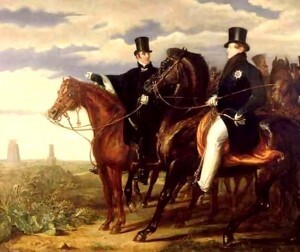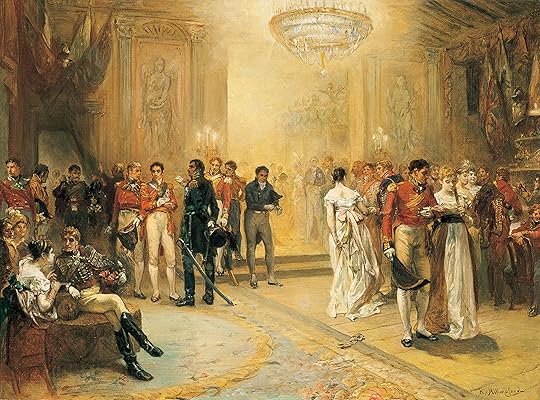Vanessa Riley's Blog, page 227
August 25, 2022
1812: A Turning Point in British History
For those of us immersed in the Regency time period, the year 1812 holds numerous significant incidents–incidents that set history on a course from the old world and into the new. Power changed hands in government and wars, the Industrial Revolution dug in its heels, and Great Britain, for all it became the most far-flung empire in history, began to receive its first glimpse of a shocking truth—they would not always rule the waves.
 George, Prince of Wales
George, Prince of WalesBy 1811, few people denied that the king was permanently mad and could no longer be head of state. The Regency bill passed making his eldest son, also a George, the Prince Regent, or the head of the government. The king, however, still showed enough glimpses of restoration to health that “Prinney” didn’t assume full powers of his role until 1812.
A gamester and profligate spender, the Prince Regent was forever petitioning Parliament for money. This placed him in the power of Parliament and the role of royalty in actually running the government of the kingdom began to diminish.
While Prinney assumed his role as head of Great Britain, a man known as Captain Ludd assumed a different kind of leadership role mostly in the north. The Luddite Rebellion fills books it is such a complex subject, a small war that ultimately took soldiers into Nottingham and York and Lancashire to put it down. Many men died.
The simplest way to explain the Luddite Rebellion is that the weavers, mostly those making stockings, couldn’t make a living. They usually had to rent their looms, the prices for their products were controlled, and they couldn’t change a thing. The Industrial Revolution was bringing in steam looms, machines that were too much competition. So the Luddites started smashing up looms and not letting people work. They sabotaged the industrial looms and spinning machines. Violence reigned powerfully for several months and took about a year to put down in full.
 Smashing of the Looms
Smashing of the LoomsA way of life was coming to an end. The cottage industry of weaving with one or maybe three looms at home was no longer viable in a world quickly becoming mechanized through steam power.
May 11, 1812 saw a horrendous incident when a man stormed into Parliament and shot the prime minister in front of witnesses. Many thought this a French plot, but it was a disturbed individual who thought he hadn’t been served justly by the government. Although the consequences of this assassination weren’t to be known for many years, it brought in a different government that delayed necessary reforms in laws and taxation that would have happened sooner had Perceval lived.
 Wellington and George Overlooking Waterloo
Wellington and George Overlooking WaterlooOn a brighter note, the war with France, that had been dragging on for nearly twenty years and not going all that well for Great Britain, finally took a turn for the better. Arthur Welsley, AKA Wellington, won the Battle of Salamanca in Spain and the tide was turning against the French at last. Of course, Napoleon didn’t help himself by invading Russia. Tremendously weakened his forces and, I think had a damaging psychological effect on the French people. The emperor was no longer invincible.
Finally for the purposes of this article, is the War of 1812, as we know it here in the United States. In England, it’s a blip on the radar, not even taught in advanced history classes. I once laid out some facts about it to a British friend who said I had to be mistaken. In no way could this fledgling country with about eighteen naval vessels, none great, have beaten down the most powerful maritime power the world had known.
But it happened. Great Britain was impressing our men because the war with France had so decimated their supply. On the smallest pretext, they boarded our ships and took away anyone they could pretend was really English and didn’t’ care about the rest. They also tried to tell us where and with whom we could trade. We said, Uh, no way, you don’t rule us any more, and did as we pleased. We declared war in June, which was kind of stupid of us rather like a domestic tabby taking on a Siberian tiger.
[image error]USS Constitution vs. HMS Guerriere by Anton Otto FischerBut we had our privateers. We built the best small, fast, and maneuverable vessels in the world. We armed them and ripped apart the British merchant fleet, taking hundreds of merchantmen until the merchants put pressure on Parliament and the United States signed the Treaty of Ghent on Christmas Eve 1814 and got everything we wanted, including the Northwest Territory. Interestingly, we didn’t win a single land battle, most of them in Michigan and Canada. Not to mention the British burned our national capital.
Britain faced the fact that she could be defeated on the high seas. Although we had a long way to go to be as powerful as England in the maritime realm, we showed our claws and made this powerful nation back down. To be fair to Great Britain, they were a bit preoccupied with France.
The Regency is a fascinating turning point in history. 1812 may have the most collective number of those turns of any year of this short but significant time period.
Originally posted 2012-02-27 10:00:00.
The post 1812: A Turning Point in British History first appeared on Vanessa Riley's Regency Reflections.
August 24, 2022
Love VS. Love
 Image: kenfotos / FreeDigitalPhotos.net
Image: kenfotos / FreeDigitalPhotos.netKristi here.
I love chocolate. I love my husband. I don’t love these things in the same way, though. It’s one of the frustrating things about the English language. We have the word like and we have the word love and there’s nothing in between. I used to think we should introduce the word “loke” into our vocabulary to establish a level between like and love. Then I could say I loke chocolate and I love my husband.
We toss the word love around a lot in the United States. That can’t be said for every other country in the world. I had a friend from England once that got a bit fed up with our usage of it. When someone said, “I love chocolate” my friend would make a face and say “Why don’t you marry it then?” Not terribly original, but it gets the message across.
The thing is we use the same word when we say we love God, and I think that’s a problem. We have just equated God with chocolate. That’s not good. When we take a concept, like love, and weaken it, we begin to lose the power that word can have.
 Photo by Jen Smith
Photo by Jen SmithHow many times have you seen someone say something like this in a book or a movie: “I love him. Well, I don’t love love him. I love him like a brother or a friend or in that I love my dog kind of way. Not that he’s a dog, I just think of them the same.”
Okay, so the part about the dog isn’t ubiquitous, but you get my point.
Jesus had several words for love when He walked the earth. Unfortunately, this distinction is often lost when we translate the Greek into English. Take the following passage from John 21 verses 15-17.
When they had eaten breakfast, Jesus asked Simon Peter, “Simon, son of John, do you love me more than these?” “Yes, Lord,” he said to Him, “You know that I love You.” “Feed My lambs,” He told him. A second time He asked him, “Simon, son of John, do you love Me?” “Yes, Lord,” he said to Him, “You know that I love You.” “Shepherd My sheep,” He told him. He asked him the third time, “Simon, son of John, do you love Me?” Peter was grieved that He asked him the third time, “Do you love Me?” He said, “Lord, You know everything! You know that I love You.” “Feed My sheep,” Jesus said.
Two different forms of the word love are used in this passage. Agape and phileo. Agape referred to deep, true, unconditional love while phileo was used more for general love more akin to loyalty and affection. If we take those differences into account, the passage above reads more like this:
When they had eaten breakfast, Jesus asked Simon Peter, “Simon, son of John, do you love me more than these?” “Yes, Lord,” he said to Him, “You know that I am your friend.” “Feed My lambs,” He told him. A second time He asked him, “Simon, son of John, do you love Me?” “Yes, Lord,” he said to Him, “You know that I am your friend.” “Shepherd My sheep,” He told him. He asked him the third time, “Simon, son of John, are you My friend?” Peter was grieved that He asked him the third time, “Are you My friend?” He said, “Lord, You know everything! You know that I am your friend.” “Feed My sheep,” Jesus said.
Peter was saddened because he had to own up to the fact that he wasn’t giving Jesus the true love that his savior wanted.
What kind of love are we offering Jesus? Do we love Him like chocolate? Our dogs? Our family? Or are we giving Him the ultimate love that He offered to us? Let’s start thinking about the meanings behind our usage of the word “love” so that when we say “I love you, God” we really mean it.
Originally posted 2012-02-24 10:00:00.
The post Love VS. Love first appeared on Vanessa Riley's Regency Reflections.
Vanessa Riley’s Workshops
#vanessarileyworkshop
View
Jun 18
Open

Had a wonderful time presenting to @atlwriters and @gwinnettlibrary about writing historical fiction. Fun to talk about research, centering your story, and the importance of your words.
Love libraries and sharing with writers. Thank you to Ann Gerson of @bookmiser for being such fun and handling book sales. She has signed copies of #islandqueen (paperback) and is taking preorders for signed copies of July’s Release Sister Mother Warrior.
#sistermotherwarrior #book #library #libraryevents #books #tbr #tbrpile #readcaribbean #caribbean #haiti #hatian #hatianrevolution #colonization #blackgirlmagic #blackculture #black #author #authorsofinstagram #womenempowerment #historicalresearch #history #research #vanessarileyhere #vanessarileylibrary #vanessarileyindiebookstore #vanessarileyspeech #vanessarileyworkshop ...
57
10
View
Aug 2
Open

Celebrated #caribbeanindependence #emancipationday today with the gracious folks (Warren et. All) at @44thand3rdbookseller !!!
It was great to talk #research and #history and #westindies with beautiful readers. Warren the patties were great. Good friend and fellow writer @sharinawrites showed. Thank you all who came and patronized this great #indiebookstore
#vanessariley #islandqueen #hats #vanessarileyindiebookstore #caribbean #readcaribbean #books #bookstagram #tbrpile #tbrstack #montserrat #grenada #barbados #guyana #Trinidad #vanessarileysign #historicalfiction #historical #islandqueenhf #newreleases #noshelfcontrol #mustreads #booksbooksbooks #vanessarileyworkshop ...
193
9
View
Oct 25
Open

At the #lasvegas #bookfestival I was able to present a workshop on writing fiction to Reveal the Hidden #History of Women
#protip
Remember (shocker) women have always existed.
Therefore women can be centered in:
1. A historical setting
2. A historical event
3. A fictionalized Jane Doe
4. A fictional account of a real person
#books #bookstagram #writing #writersofinstagram #writingcommunity #historicalfictionwriter #reader #historicalfiction #historical #islandqueenhf #booksbooksbooks #vanessarileyworkshop #vanessarileyhere ...
70
4
Originally posted 2021-11-14 08:36:52.
The post Vanessa Riley’s Workshops first appeared on Vanessa Riley's Regency Reflections.
August 23, 2022
“L.O.V.E. in the Regency”
“L.O.V.E. in the Regency”
I can wax on about the lovely aspects of the Regency era and the fiction it has spawned, but to reign in my thoughts, I’ll limit my reflections to four elements, each beginning with a letter of LOVE.
L … The Language is delightful. Where else can you read such bits of “slang” as charming as the cant of the Regency? Aren’t there a few celebrities today about whom it could be said “She has more hair than wit”? Referring to someone as “attics to let” wouldn’t be kind, but it is a rather smile-provoking turn-of-phrase. I’ll leave this topic with one more of my favorites: “Stepping into parson’s mousetrap”, which reflects some gentlemen’s views on marriage.
O … Society had Order and structure which is lacking today. When’s the last time most of us had an “at-home day” upon which your friends knew you’d be at home and expecting visits. Have you gone to a tea, musicale, ball, or garden party of late? The fascinating protocol of hosting, attending, making guest lists, sending invitations, and subtle gradations of how deep one shall bow or curtsey; these bygone rules are distinct and keep our interest.
V … Feminine Virtue was the order of the day. The unmarried maiden’s virtue was carefully guarded, so as to bring a pure virgin to the marriage altar. This virtue is sadly absent today, and reading about a day in which purity was guarded can be an inspiration. Reading Christian Regency fiction allows one to recapture the thrill of a first kiss, perhaps at the altar, without the seamy pages that follow in secular romances.
E … If you read for Escape, Regency England is a delightful place to visit. Most of us will never make it over to intriguing Bath, Brighton, or Tunbridge Wells. We won’t tread the ground of Northumberland, Sussex, or the like. But, ahh, flip open the typical Regency, and you’re transported to a lovely place and time, all bound within the pages of the book in your hands.
Originally posted 2012-02-22 10:00:00.
The post “L.O.V.E. in the Regency” first appeared on Vanessa Riley's Regency Reflections.
Surprised by War
Dancing and travel: two of the joys of the Regency. My picture of that elegant period of history is full of flowing dresses and swiftly-moving carriages.
But the balls and the journeys didn’t always end as planned, and on two memorable occasions the frivolity of the English was brought to a shocking halt not by a lame horse or a torn hem, but by the intrusion of soldiers, terror, and war.
[image error] Storm in the Strait of Dover by Louis Meyer (public domain)
The Breaking of the Peace of Amiens
In 1802, there was a halt to the hostilities between France and England and as a result thousands of British visitors poured into Paris. Englishmen of means had always been fond of visiting the continent, but war had stopped them from indulging in this fondness for some time. When the Peace of Amiens was signed, many of then crossed the Channel to see the sights.
In fact, a gentleman named Edmund John Eyre went over to France and wrote an account of his journey, hoping to sell it as a guidebook to other English travelers. (You can read an electronic copy here.) Alas, he was not to make much money on his endeavor, because in May of 1803, just a little over a year after peace was declared, war broke out again between the two countries.
The problem for our British travelers? When war recommenced, the French declared that all male British citizens between the ages of 18 and 60 currently in France were to be arrested. Many English tourists were trapped on the wrong side of the Channel, most of them unable to return home to England for over a decade. They went to France to see the sights, but they ended up seeing the entire war – from the wrong side.
 The Duchess of Richmond's Ball, by Robert Hillingford (PD-Art|PD-old-100)
The Duchess of Richmond's Ball, by Robert Hillingford (PD-Art|PD-old-100)The Duchess of Richmond’s Ball
At the other end of that long decade of war came another surprise for some pleasure-seeking English ladies and gentlemen. Once again, those who thought that the war was over were in for a shock.
In Brussels, in 1815, Lady Richmond was holding a ball attended by Wellington and many of his soldiers. There was dancing and drinking, but in the middle of the party Wellington received a message, a confirmed report that Napoleon had escaped and was coming to meet them with an entire army marching at his heels.
The people dancing at the ball didn’t know it, but they were scarce days away from one of the most famous military encounters of all time: the Battle of Waterloo. Some men even went directly from the ball to the battle at Quatre Bras still wearing their evening dress.
It’s hard to picture this happening today, with the nearly instant communication offered to us by telephones and the email. But back then, news traveled only as fast as a boat might sail or a horse might ride. In an instant, a holiday might become an exile, and a dance might become a war.
Originally posted 2012-02-20 10:00:59.
The post Surprised by War first appeared on Vanessa Riley's Regency Reflections.
August 22, 2022
Jane Austen’s Prayers
JANE AUSTEN’S PRAYERS
We are all familiar with Sense and Sensibility, Pride and Prejudice, and Northanger Abbey – but did you know that Ms. Austen also wrote three prayers? Jane likely penned her three prayers as “evening prayers,” intending them to be read aloud. Let’s take a look:
JANE AUSTEN’S FIRST PRAYER
(Abridged version. The full text can be read here.)
Give us grace almighty father, so to pray, as to deserve to be heard, to address thee with our hearts, as with our lips. Thou art everywhere present, from thee no secret can be hid. May the knowledge of this, teach us to fix our thoughts on thee, with reverence and devotion that we pray not in vain.
May we now, and on each return of night, consider how the past day has been spent by us, what have been our prevailing thoughts, words and actions during it, and how far we can acquit ourselves of evil.
Have we thought irreverently of thee, have we disobeyed thy commandments, have we neglected any known duty, or willingly given pain to any human being? Incline us to ask our hearts these questions oh! God, to save us from deceiving ourselves by pride or vanity.
Give us a thankful sense of the blessings in which we live, of the many comforts of our lot; that we may not deserve to lose them by discontent or indifference. Hear us almighty God, for his sake who has redeemed us, and taught us thus to pray. Amen.
Isn’t that beautiful? This prayer holds true to Austen’s moving and articulate style and offers wonderful insight to the types of prayers spoken during the Regency. It is important, however, to remember that while the words themselves are indeed lovely, it is not the eloquence of the words that is pleasing to God – it is the attitude with which the prayer is spoken.
You see, prayer is an outpouring of faith, and we pray to strengthen our relationship with God. And how do you strengthen relationships? By sharing your dreams, fears, and desires. God is faithful to hear our prayers, and even if we do not always have the perfect words, God knows our hearts. So I challenge you: Find somewhere quiet where you can be alone with God and have a conversation. Share your heart with Him, and listen for what He has to say.
Want to read more about what God has to say about prayer? Here are some verses to get you started.
Matthew 6:5-14 | Romans 8:26 | Philippians 4:6-7 | Psalm 107:28-30
Matthew 7:7 | John 14:13-14 | Mark 11:24 | Ephesians 6:18
Originally posted 2012-02-17 10:00:00.
The post Jane Austen’s Prayers first appeared on Vanessa Riley's Regency Reflections.
Scattered Petals
Tammy here.
 I am happy to say it only took twenty years to finally make him understand. For years I got roses for Valentine’s Day or my Birthday. They were nice, but where’s the thought in that? Then one year in October on my birthday I came home from work to find Black Eyed Susan petals (my very own special birthday flowers from God every year) scattered in a path from my front door to the kitchen table leading to a mason jar filled with a bouquet of the yellow flowers. It didn’t matter I had to clean up the twigs and leaves scattered over the floor. It was the best birthday ever and he was so proud of himself.
I am happy to say it only took twenty years to finally make him understand. For years I got roses for Valentine’s Day or my Birthday. They were nice, but where’s the thought in that? Then one year in October on my birthday I came home from work to find Black Eyed Susan petals (my very own special birthday flowers from God every year) scattered in a path from my front door to the kitchen table leading to a mason jar filled with a bouquet of the yellow flowers. It didn’t matter I had to clean up the twigs and leaves scattered over the floor. It was the best birthday ever and he was so proud of himself.
Images courtesy of morguefile.com. No attribution required.
Originally posted 2012-02-15 10:00:00.
The post Scattered Petals first appeared on Vanessa Riley's Regency Reflections.
August 21, 2022
Happy Valentine’s Day!
Happy Valentine’s Day from the authors of Regency Reflections.
Here’s wishing you a day filled with the love of your friends, family, and Lord.
Originally posted 2012-02-14 08:00:00.
The post Happy Valentine’s Day! first appeared on Vanessa Riley's Regency Reflections.
Reflections on Valentine’s Day
Cards were already a popular custom for all classes by regency times. Most were home-and-handmade from plain to fancy, depending on what the sender could afford. Fancier ones might include gilt-edged paper and real lace (paper lace didn’t come into production until later in the century). Woodcuts or copperplate engraved cards existed but this process was still hand-done and thus time-consuming, so mass-produced cards didn’t come on the market until the 1820s. This coincided with the standardization of the postal system, making sending cards cheaper.
For those who had trouble with a rhyme, there were publications called “Valentine writers,” chock full of ready-made verses for gentlemen to use. Some even contained poetical replies for ladies to use.
Everybody’s Valentine Writer; or True Lover’s Notebook; and Kemmish’s Annual and Universal Valentine Writer, or the Lover’s Instructor were a couple published in England in the late 18th century.
A sample of a lady’s reply to a gentleman’s verse, from Everybody’s Valentine Writer:
The Language of Flowers
To a Gentleman
With proverbs, sir, I see you play;
With proverbs, too, I answer nay—
Although special significance of flowers became most popular in Victorian times, lovers’ messages through flowers was already seen in regency times. Lady Mary Wortley Montagu, wife of the British ambassador to the Ottoman Empire , described a “secret language of flowers,” when her letters home were published posthumously in 1763. This language was a form of Turkish and Persian poetry called selam, which used words that rhymed with flower names. In 18th century Europe this developed into giving flowers sentimental significance (ie. a rose symbolizing love).
Various and changing meanings were ascribed to different flowers, but you wouldn’t want to receive a striped carnation in 1819, which according to Madame Charlotte de la Tour, who published a dictionary on flower language entitled [sic] Le Language des Fleur, meant “I’m sorry, I must say no.”
Nor would you want to receive a yellow carnation, which meant “You disappoint me.”
Better would be a red rose from your true love; or a pansy (“you occupy my thoughts”); or perhaps an arum, which meant ardor.
The Art of the Valentine CardThe reputedly oldest v alentine card in existence is o wned by th e British Royal Mail. I t dates from 1790. Its four points open up to reveal a love poem, but the outside words are already quite enchanting:
“My dear the Heart which you behold,
Will break when you the same unfold,
Even so my heart with lovesick pain,
Sure wounded is and breaks in twain.”
Sources:
The Evening Independent, Feb. 14, 1977
The Year’s Festivals, Helen Philbrook Patten, 1903
The Quest of the Quaint, Virginia Robie, 1916
http://www.newyorker.com/archive/1947/02/15/1947_02_15_021_TNY_CARDS_000207379
http://www.nationalarchives.gov.uk/documents/11feb2011-aac.pdf
Originally posted 2012-02-13 10:00:00.
The post Reflections on Valentine’s Day first appeared on Vanessa Riley's Regency Reflections.
August 20, 2022
Providence, Let Me Love You
Vanessa here with a devotion from my heart:
Providence, let me love You like my chosen betrothed. Flood my arms with anticipation, so the pimples tickle the lace of my best ball gloves. I sweep my fan and search for You above the crowds.
With a quickened pulse, I slip away to greet You in the privacy of my hostess’s garden. Let me come to You uncaring of my appearance, unworried about my reputation. Let no concern shadow my heart about my unworthiness of this match. Pray let me not fall victim to my doubts or be persecuted by my memories, the false promises of my past.
I run to You now in the midst of the spring shower with muslin and sarcenet gathered in my palms. My lifted skirts expose my ankles to the soft kisses of raindrops. I twirl in circles trampling my foolish pride with the tender soles of my slippers. Joy fills my lungs for at last I know it is You who loves me, just as I am.
Let me embrace You like my true betrothed and seek You in the hidden places. The labors of my hands, the burdens upon my shoulders disappear in Your presence. The lightness of Your yoke frees me to sing as Your fragrance, the myrrh and frankincense, anoints the cuff of my sleeve. I smell safety and sense whispers of encouragement. My heart pounds at the softness of Your touch, the shield of protection You gird about me. Though it is I who strayed, I weep at the openness of Your arms, Your forgiveness.
Let me love You in fearless reverence. When the Ton scoff at Your humble beginnings and call You a tradesman’s son, make me not shun You or deny my feelings. I should know now that Your riches provide honor and inheritance for all my generations. Grow my heart to be as generous and as loving. Aid me to be light in this world and a proper helpmate for your ministry.
A wave of shyness grips me. I want to turn, but Your patience draws me. I lower my fan once more and glance at your beauty. There can be no falling away or breaking with You. I shall cling to your promises, your comfort. My lamp is trimmed and full of oil, and I await You, no longer a foolish virgin, but a hopeful bride seeking her Prince of Peace.
As you have your time of devotion this week, study these verses. Your true betrothed has sent an invitation.
Mathew 11:28-29
Mathew 25:1-13
Psalm 68:19
Song of Solomon 2:6
1 Corinthians 15:9
Originally posted 2012-02-10 07:00:00.
The post Providence, Let Me Love You first appeared on Vanessa Riley's Regency Reflections.









